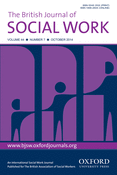-
Views
-
Cite
Cite
Ephrat Huss, Roni Kaufman, Avril Sibony, Children's Drawings and Social Change: Food Insecurity and Hunger among Israeli Bedouin Children, The British Journal of Social Work, Volume 44, Issue 7, October 2014, Pages 1857–1878, https://doi.org/10.1093/bjsw/bct034
Close - Share Icon Share
Abstract
Food insecurity and hunger, which are on the rise in affluent Western countries, may negatively affect children's physical, social, emotional and cognitive functioning. Although there is growing evidence of the high rate of food insecurity and hunger among Bedouin families and their children in Israel, little is known about how the children themselves experience the problem and how it impacts their life. The present study sought to explore and clarify children's experience of food insecurity. The research population included forty-two Israeli Bedouin impoverished children, aged nine to eleven. The analysis of children's drawing was chosen as the research instrument because it enabled psychological as well as phenomenological insight into the children's experience of food insecurity. This study, however, goes beyond the use of art to assess children's emotional state, because enabling the children to draw food insecurity gave them a strong and communicative public voice of their own. After the study had been completed, the drawings also proved useful in efforts to promote awareness about the personal, community, cultural and social dimensions of the problem and the need for community action and policy change to mitigate and eliminate it.




